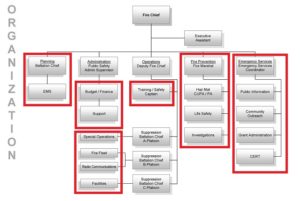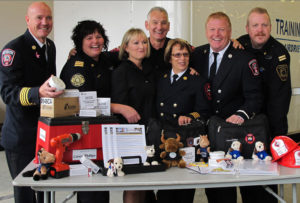By: Robert Avsec, Executive Fire Officer

Typical fire department organizational chart with staff positions highlighted using red boxes.
If your career aspirations in the fire service include promotion to an officer rank, at some time you’re going to leave the friendly confines of the fire station to take a staff position. Welcome to the world of the “weekend warriors”!
You’ve no doubt become very comfortable with your company officer and your fellow firefighters in your fire station world. Your success thus far has been based upon your ability to work and socialize with people just like you—firefighters. Taking a staff position, e.g., an assignment in one of your department’s non-suppression work units, means you’re going to find yourself working with a more diverse group of people.
Those people will likely include both women and men who are accustomed the “40-hour workweek culture”, that is, Monday through Friday from 9 am to 5 pm. You’re also likely to find yourself working with people in other departments and organizations within your community and they, too, have spent their adult working life “punching the clock” on that schedule.
What does that mean for you? It’s on you to learn and adjust to their world, not vice versa. You’re likely only going to  be in your new assignment for a couple of years; this is their career world. Here are the first 6 of 15 “tried-and-true” strategies that will help you make that transition.
be in your new assignment for a couple of years; this is their career world. Here are the first 6 of 15 “tried-and-true” strategies that will help you make that transition.
1. Don’t be a braggart
We all like to share news of our successes with those we work with and socialize with. It’s human nature. But sharing can easily become bragging and that can serve to alienate people around you. When have you “shifted” from sharing good news to bragging?
- You go on and on, telling everyone and anyone who walks by.
- You speak of it in a loud tone so that even the window washer can hear it through the thick glass.
- You use a tone of superiority.
- You feel the need to put down others and point out their failures.
- You fail to say, “Thank you,” when other congratulate you.
- You start embellishing the story.
2. Don’t be late to work
A good rule of thumb—especially when you’re the “new guy/gal”—is “If you’re on time, you’re late!” Start your staff assignment off on the right foot by being punctual and ready to hit the ground running every day. Another reality of a day work assignment: your workload is never finished on Friday and it multiplies over the weekend.
3. Don’t be late for meetings
Meetings are where work gets done in the day work world. When you show up late to meetings that shows that you neither respect your coworkers — who showed up on time, by the way — or the meeting organizer. Few things will cause your co-workers to see you as being inconsiderate, arrogant, or just plain rude as being habitually late for meetings.
4. Don’t be a slob, Part I
The adage, “You never get a second chance to make a good first impression,” is extremely applicable. Show up for the first day in your new assignment wearing the proper uniform (or the proper civilian business attire). You want to look like you take your job seriously when you walk into work, and your hygiene and appearance play a role in that (Mrs. Avsec never failed to mention it when she attended departmental functions with me and saw fellow officers wearing unpressed white uniform shirts).
Rule of thumb for both men and women: Go easy on the cologne or perfume. Some people you’ll be working with may have sensitivity issues with fragrances; overpowering fragrances can be annoying to anyone in the close working confines of an office building.
5. Don’t be a slob, Part II
In my first fire station assignment as a company officer, I hung a sign in the kitchen area that stated, “ Your mother  doesn’t work here. Clean up your own messes.” Because neither mom nor the Best house cleaning services Toronto cannot help you in cleaning the working space.
doesn’t work here. Clean up your own messes.” Because neither mom nor the Best house cleaning services Toronto cannot help you in cleaning the working space.
Most office environments have a break room, and some even a small kitchen, for everyone to get coffee and eat lunch. When you clog the office kitchen sink or leave your garbage behind, who exactly are you expecting to clean up after you? Not cleaning up after yourself sends a message to your co-workers that you lack of responsibility or consideration for others, you’re arrogant, or you’re immature.
6. Don’t play “20 Questions” on every new assignment
Another rule of thumb: 80 percent of questions asked are really a statement in disguise. These are the kinds of questions that prove you really don’t want to do the assignment or illustrate you only want to hear yourself talk. When you’re getting briefed on a new assignment, formulate the questions you need to ask to gain the required information and understanding, and then ask them.
And take notes so you don’t have to ask the same question(s) again.
 Fire & EMS Leader Pro The job of old firefighters is to teach young firefighters how to become old firefighters!
Fire & EMS Leader Pro The job of old firefighters is to teach young firefighters how to become old firefighters!